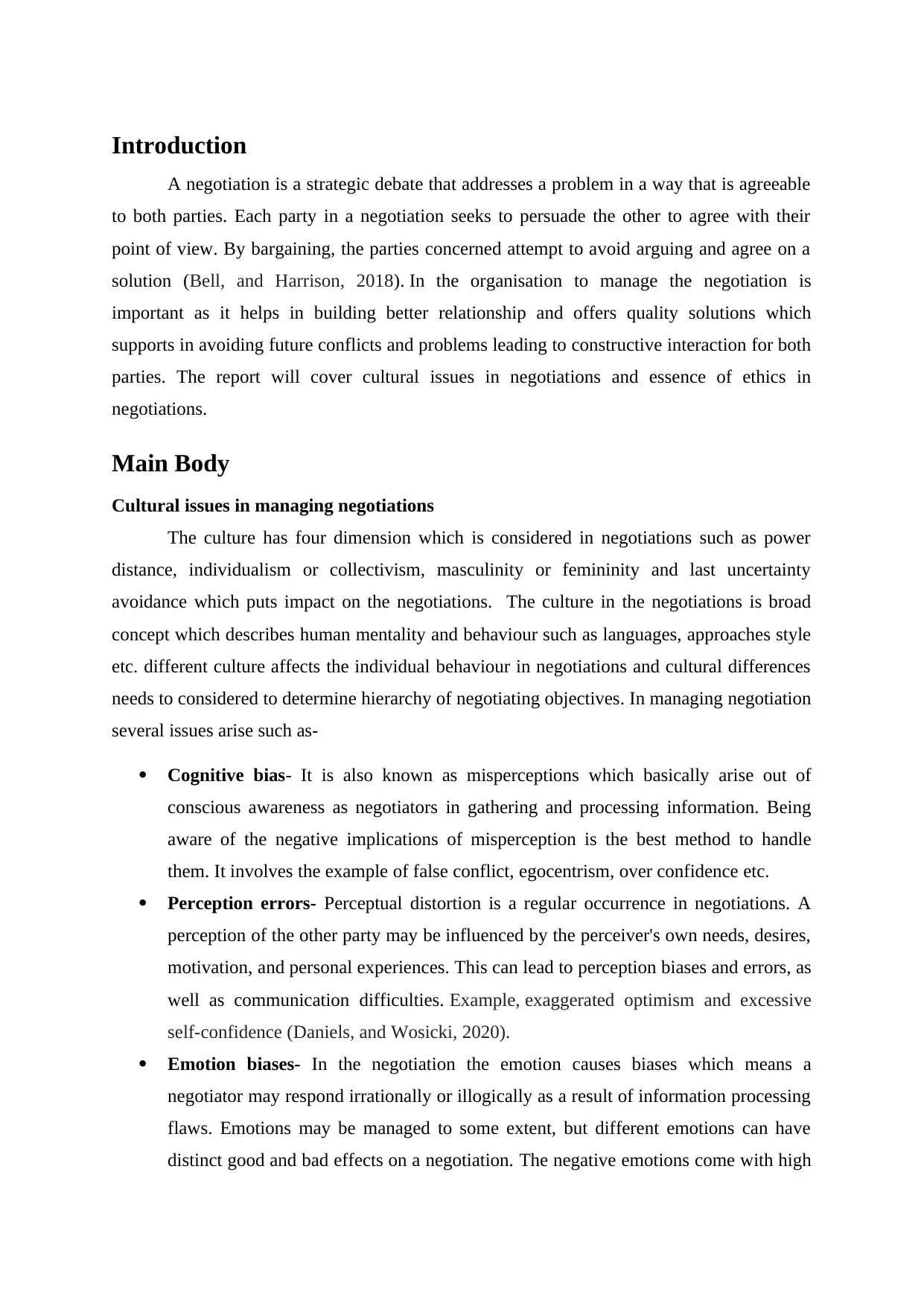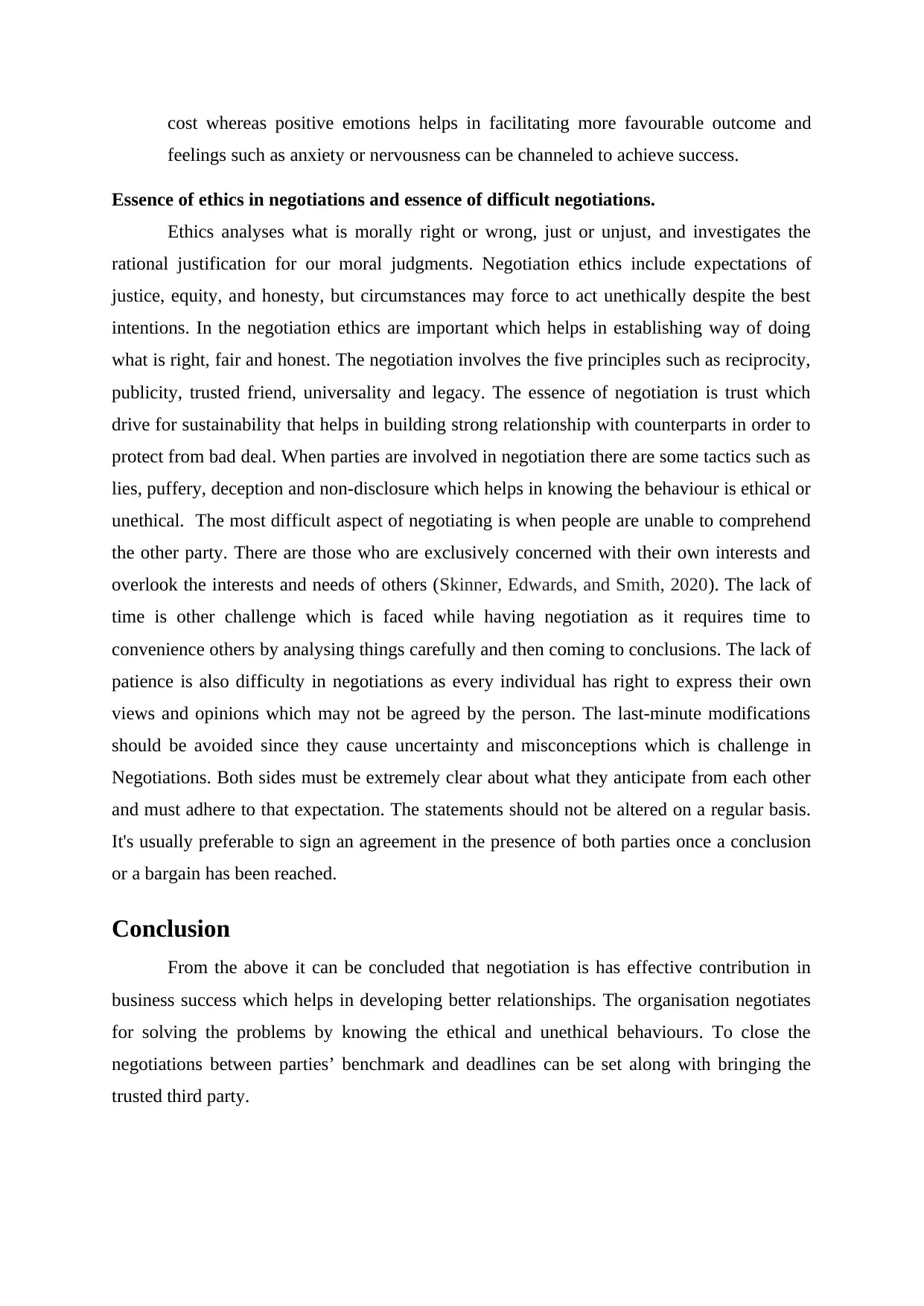Report on Cultural Issues in Managing Negotiation and Ethics
VerifiedAdded on 2023/06/10
|6
|908
|365
Report
AI Summary
This report delves into the critical cultural issues that impact negotiation processes, highlighting the significance of understanding cultural dimensions such as power distance, individualism, and uncertainty avoidance. It examines cognitive biases, perception errors, and emotional influences that can arise during negotiations, emphasizing the importance of ethical considerations and establishing trust. The report explores the essence of ethical behavior, including principles like reciprocity and universality, while also addressing the challenges of difficult negotiations, such as time constraints, lack of patience, and last-minute modifications. It concludes by underscoring the role of effective negotiation in building relationships and achieving successful business outcomes, offering insights into managing ethical and unethical behaviors. The report also emphasizes the importance of setting benchmarks, deadlines and involving trusted third parties to facilitate successful negotiation outcomes.

Cultural issues in managing
negotiation
negotiation
Paraphrase This Document
Need a fresh take? Get an instant paraphrase of this document with our AI Paraphraser

Contents
Introduction.........................................................................................................................................3
Main Body............................................................................................................................................3
Cultural issues in managing negotiations......................................................................................3
Essence of ethics in negotiations and essence of difficult negotiations.........................................4
Conclusion............................................................................................................................................4
References............................................................................................................................................5
Introduction.........................................................................................................................................3
Main Body............................................................................................................................................3
Cultural issues in managing negotiations......................................................................................3
Essence of ethics in negotiations and essence of difficult negotiations.........................................4
Conclusion............................................................................................................................................4
References............................................................................................................................................5

Introduction
A negotiation is a strategic debate that addresses a problem in a way that is agreeable
to both parties. Each party in a negotiation seeks to persuade the other to agree with their
point of view. By bargaining, the parties concerned attempt to avoid arguing and agree on a
solution (Bell, and Harrison, 2018). In the organisation to manage the negotiation is
important as it helps in building better relationship and offers quality solutions which
supports in avoiding future conflicts and problems leading to constructive interaction for both
parties. The report will cover cultural issues in negotiations and essence of ethics in
negotiations.
Main Body
Cultural issues in managing negotiations
The culture has four dimension which is considered in negotiations such as power
distance, individualism or collectivism, masculinity or femininity and last uncertainty
avoidance which puts impact on the negotiations. The culture in the negotiations is broad
concept which describes human mentality and behaviour such as languages, approaches style
etc. different culture affects the individual behaviour in negotiations and cultural differences
needs to considered to determine hierarchy of negotiating objectives. In managing negotiation
several issues arise such as-
Cognitive bias- It is also known as misperceptions which basically arise out of
conscious awareness as negotiators in gathering and processing information. Being
aware of the negative implications of misperception is the best method to handle
them. It involves the example of false conflict, egocentrism, over confidence etc.
Perception errors- Perceptual distortion is a regular occurrence in negotiations. A
perception of the other party may be influenced by the perceiver's own needs, desires,
motivation, and personal experiences. This can lead to perception biases and errors, as
well as communication difficulties. Example, exaggerated optimism and excessive
self-confidence (Daniels, and Wosicki, 2020).
Emotion biases- In the negotiation the emotion causes biases which means a
negotiator may respond irrationally or illogically as a result of information processing
flaws. Emotions may be managed to some extent, but different emotions can have
distinct good and bad effects on a negotiation. The negative emotions come with high
A negotiation is a strategic debate that addresses a problem in a way that is agreeable
to both parties. Each party in a negotiation seeks to persuade the other to agree with their
point of view. By bargaining, the parties concerned attempt to avoid arguing and agree on a
solution (Bell, and Harrison, 2018). In the organisation to manage the negotiation is
important as it helps in building better relationship and offers quality solutions which
supports in avoiding future conflicts and problems leading to constructive interaction for both
parties. The report will cover cultural issues in negotiations and essence of ethics in
negotiations.
Main Body
Cultural issues in managing negotiations
The culture has four dimension which is considered in negotiations such as power
distance, individualism or collectivism, masculinity or femininity and last uncertainty
avoidance which puts impact on the negotiations. The culture in the negotiations is broad
concept which describes human mentality and behaviour such as languages, approaches style
etc. different culture affects the individual behaviour in negotiations and cultural differences
needs to considered to determine hierarchy of negotiating objectives. In managing negotiation
several issues arise such as-
Cognitive bias- It is also known as misperceptions which basically arise out of
conscious awareness as negotiators in gathering and processing information. Being
aware of the negative implications of misperception is the best method to handle
them. It involves the example of false conflict, egocentrism, over confidence etc.
Perception errors- Perceptual distortion is a regular occurrence in negotiations. A
perception of the other party may be influenced by the perceiver's own needs, desires,
motivation, and personal experiences. This can lead to perception biases and errors, as
well as communication difficulties. Example, exaggerated optimism and excessive
self-confidence (Daniels, and Wosicki, 2020).
Emotion biases- In the negotiation the emotion causes biases which means a
negotiator may respond irrationally or illogically as a result of information processing
flaws. Emotions may be managed to some extent, but different emotions can have
distinct good and bad effects on a negotiation. The negative emotions come with high
⊘ This is a preview!⊘
Do you want full access?
Subscribe today to unlock all pages.

Trusted by 1+ million students worldwide

cost whereas positive emotions helps in facilitating more favourable outcome and
feelings such as anxiety or nervousness can be channeled to achieve success.
Essence of ethics in negotiations and essence of difficult negotiations.
Ethics analyses what is morally right or wrong, just or unjust, and investigates the
rational justification for our moral judgments. Negotiation ethics include expectations of
justice, equity, and honesty, but circumstances may force to act unethically despite the best
intentions. In the negotiation ethics are important which helps in establishing way of doing
what is right, fair and honest. The negotiation involves the five principles such as reciprocity,
publicity, trusted friend, universality and legacy. The essence of negotiation is trust which
drive for sustainability that helps in building strong relationship with counterparts in order to
protect from bad deal. When parties are involved in negotiation there are some tactics such as
lies, puffery, deception and non-disclosure which helps in knowing the behaviour is ethical or
unethical. The most difficult aspect of negotiating is when people are unable to comprehend
the other party. There are those who are exclusively concerned with their own interests and
overlook the interests and needs of others (Skinner, Edwards, and Smith, 2020). The lack of
time is other challenge which is faced while having negotiation as it requires time to
convenience others by analysing things carefully and then coming to conclusions. The lack of
patience is also difficulty in negotiations as every individual has right to express their own
views and opinions which may not be agreed by the person. The last-minute modifications
should be avoided since they cause uncertainty and misconceptions which is challenge in
Negotiations. Both sides must be extremely clear about what they anticipate from each other
and must adhere to that expectation. The statements should not be altered on a regular basis.
It's usually preferable to sign an agreement in the presence of both parties once a conclusion
or a bargain has been reached.
Conclusion
From the above it can be concluded that negotiation is has effective contribution in
business success which helps in developing better relationships. The organisation negotiates
for solving the problems by knowing the ethical and unethical behaviours. To close the
negotiations between parties’ benchmark and deadlines can be set along with bringing the
trusted third party.
feelings such as anxiety or nervousness can be channeled to achieve success.
Essence of ethics in negotiations and essence of difficult negotiations.
Ethics analyses what is morally right or wrong, just or unjust, and investigates the
rational justification for our moral judgments. Negotiation ethics include expectations of
justice, equity, and honesty, but circumstances may force to act unethically despite the best
intentions. In the negotiation ethics are important which helps in establishing way of doing
what is right, fair and honest. The negotiation involves the five principles such as reciprocity,
publicity, trusted friend, universality and legacy. The essence of negotiation is trust which
drive for sustainability that helps in building strong relationship with counterparts in order to
protect from bad deal. When parties are involved in negotiation there are some tactics such as
lies, puffery, deception and non-disclosure which helps in knowing the behaviour is ethical or
unethical. The most difficult aspect of negotiating is when people are unable to comprehend
the other party. There are those who are exclusively concerned with their own interests and
overlook the interests and needs of others (Skinner, Edwards, and Smith, 2020). The lack of
time is other challenge which is faced while having negotiation as it requires time to
convenience others by analysing things carefully and then coming to conclusions. The lack of
patience is also difficulty in negotiations as every individual has right to express their own
views and opinions which may not be agreed by the person. The last-minute modifications
should be avoided since they cause uncertainty and misconceptions which is challenge in
Negotiations. Both sides must be extremely clear about what they anticipate from each other
and must adhere to that expectation. The statements should not be altered on a regular basis.
It's usually preferable to sign an agreement in the presence of both parties once a conclusion
or a bargain has been reached.
Conclusion
From the above it can be concluded that negotiation is has effective contribution in
business success which helps in developing better relationships. The organisation negotiates
for solving the problems by knowing the ethical and unethical behaviours. To close the
negotiations between parties’ benchmark and deadlines can be set along with bringing the
trusted third party.
Paraphrase This Document
Need a fresh take? Get an instant paraphrase of this document with our AI Paraphraser

References
Bell, J. and Harrison, B.T. eds., 2018. Vision and values in managing education: Successful
leadership principles and practice. Routledge.
Daniels, M. and Wosicki, C., 2020. Wedding planning and management: Consultancy for
diverse clients. Routledge.
Skinner, J., Edwards, A. and Smith, A.C., 2020. Qualitative research in sport management.
Routledge.
Bell, J. and Harrison, B.T. eds., 2018. Vision and values in managing education: Successful
leadership principles and practice. Routledge.
Daniels, M. and Wosicki, C., 2020. Wedding planning and management: Consultancy for
diverse clients. Routledge.
Skinner, J., Edwards, A. and Smith, A.C., 2020. Qualitative research in sport management.
Routledge.

⊘ This is a preview!⊘
Do you want full access?
Subscribe today to unlock all pages.

Trusted by 1+ million students worldwide
1 out of 6
Related Documents
Your All-in-One AI-Powered Toolkit for Academic Success.
+13062052269
info@desklib.com
Available 24*7 on WhatsApp / Email
![[object Object]](/_next/static/media/star-bottom.7253800d.svg)
Unlock your academic potential
Copyright © 2020–2026 A2Z Services. All Rights Reserved. Developed and managed by ZUCOL.





